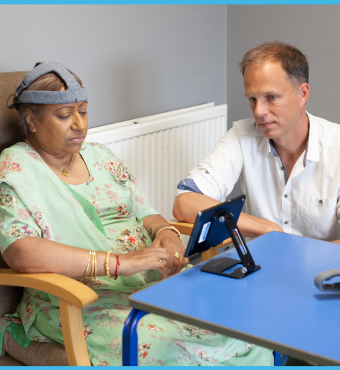
By Julie Clayton – World Alzheimer's Month, September 2025
When it comes to dementia research, whose voice matters? The answer is simple: everyone’s. But in reality, not everyone is equally represented in dementia studies — and that needs to change.
People from minority ethnic communities are often diagnosed with dementia later than White UK citizens. By the time they receive a diagnosis, their condition may be more advanced, meaning they miss out on vital early support and treatment. Research shows that these inequalities exist not only in access to services, but in research participation itself. Most dementia research studies recruit mainly White British participants — which means we don’t always know if treatments, tests, and care strategies work equally well for everyone.
As Professor Charles Marshall reminded us at the Alzheimer’s Society Conference this month:
“Do treatments work for everyone? Without representation we don’t know. We know that people from minoritized ethnic backgrounds are more at risk of dementia. So if you're more at risk, it's fundamentally unfair to exclude you from trials.”
At the Brain Centre in Bristol, we’re tackling this challenge head-on. We’re taking research out of the hospital and into the heart of local communities. By working with groups such as Dhek Bhal (supporting South Asian families), the Chinese Community Wellbeing Society, and Bristol Black Carers, we’re building partnerships based on trust and understanding.
Recently, we introduced Dhek Bhal members to Fastball, a lightweight EEG cap that measures brain activity to help detect early signs of dementia. This technology has huge potential to make diagnosis faster and more accurate — but only if it is tested in a way that works for everyone. Community members told us what would help them take part: easier access, familiar settings, language support, and having someone they trust by their side.
This isn’t just outreach — it’s partnership. Community voices are shaping how we design studies, from choosing the right locations to providing translation and travel support. These conversations help ensure our research is fair, inclusive, and relevant to the people it is meant to benefit.
For Alzheimer’s and other dementias, early and accurate diagnosis can make a life-changing difference. To achieve that, we need research that reflects the full diversity of our society. As Zehra Haq, CEO of Dhek Bhal, says:
“It’s important for researchers to genuinely connect with our South Asian community and other equity-deserving groups – to clearly communicate the purpose of research and the value of their contributions. This fosters inclusion, affirms their worth as citizens, and helps address health inequalities.”
This World Alzheimer's Month, let’s remember: better research starts with better representation. By listening to all voices, we can build a future where Alzheimer’s diagnosis and treatment work for everyone.
Photo credit: Carrie Hitchcock
